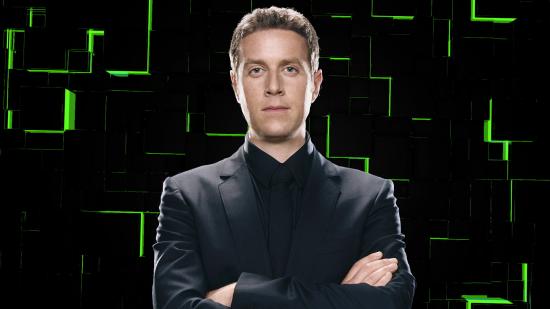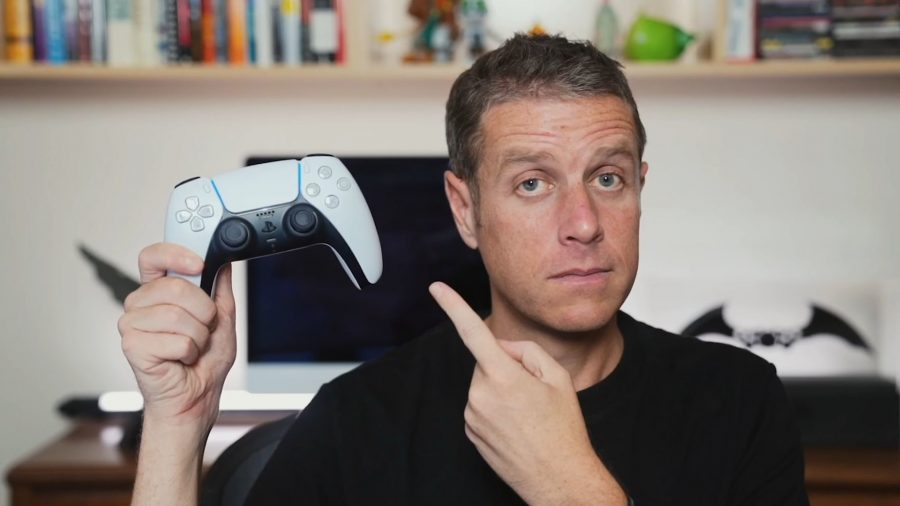The landscape of videogames has changed greatly over the past two decades, and Geoff Keighley has seen it all. So, when given the opportunity to have a conversation with the industry expert, we wanted to get his take on all the upheaval we’ve seen lately.
Studio acquisitions by major publishers have been one of the most recent talking points in the industry. Microsoft bought Bethesda and Activision Blizzard, Sony bought Bungie – are we seeing the death of the independent studio?
“I actually think, more than ever, there are more opportunities for independent studios. And, yes, there’s a lot of consolidation at the highest levels of the industry,” Keighley says. “But I also think there are more independent studios that are getting independent funding than ever before. It’s exciting for me that, at my shows, we’re able to focus on a lot of other independent developers. One game that we’re showing at Summer Game Fest is made by a single developer. And they’ll be on the same stage as the biggest game franchises in the world.”
He points out that at the last The Game Awards, big publishers like EA, Ubisoft, and Activision didn’t have much of a showing, yet the show had the biggest line-up of games of any previous TGA because of indies doing their own thing. “I actually think my platforms are hopefully empowering to developers that they don’t have to sign up with a big studio, and we can still put them on stage.”
The landscape has changed to the point where major publishers have to actually prove their value now that we have digital distribution that can go directly to the consumer, Keighley tells us, and that studios can now forego publishers if they can find alternative sources of funding. “I actually think there’s a really bright future for independent games, and not through the mainstream publisher system.” So, while there’s consolidation at the top, that doesn’t mean it’s the death knell for the indie developer; in fact, Keighley thinks it’s the opposite.
Plus, there are far more opportunities these days. Part of the changing videogame landscape is the concept of the metaverse. While it might be overlooked by some as a fad, Keighley thinks it could be huge for the future of gaming. “I did the Star Wars Fortnite event a couple of years ago with JJ Abrams, which was really cool to have millions of concurrent people all together to talk with JJ and see a clip of the film. I’m excited about that stuff. We did a couple experiments in the metaverse world around Game Awards last year on a few platforms – I get excited about that idea, that people will watch the show from within gaming universes.”
Keighley started The Game Awards on the premise that they would try to push the show out on as many platforms, devices, and screens as possible, and he sees the metaverse as an extension of that. “I think the next phase of The Game Awards will be bringing the Game Awards within the games that you play.” It won’t fully replace the YouTube livestream, he tells us, but he’s excited to explore the possibilities. “We’re skirting the edges of it with the Steam demos. It’s not like it’s gonna flip a switch and next year that’s going to work, but I am excited about the possibilities of doing mass events inside gaming worlds, and the stuff I’ve done with Fortnite and the Star Wars thing got me really excited about the possibilities there.”
But it’s not just the metaverse pushing the boundaries of the videogame industry, subscription services and cloud-based services are too. With Microsoft’s push towards cloud-based streaming, will we even need consoles at all? “I think, eventually, you’re probably just gonna have a controller and your PlayStation will be effectively in the cloud,” he says. “I don’t think that’s a bad thing, right?”
Keighley travels a lot, and tells us that streaming makes playing games a whole lot easier for him, even if it will take some time before worldwide infrastructure can support it. “I was playing Fortnite on the xCloud beta a week or two ago, and it’s pretty cool. One click, and I’m playing on my phone again. It’s pretty amazing technically and I do think that will only get better.”
But, what about the way we purchase games? With Microsoft pushing Game Pass harder than ever, will we even buy individual titles anymore? Well, Keighley doesn’t think they’re going anywhere. “I’m a big believer that there will still be premium games that can command premium prices,” Keighley says. “For Grand Theft Auto 6, I’d probably spend $200 on that game.” The Canadian argues that there will always be games that are worth that price point, comparing them to West End and Broadway shows that you’ll always “blow a ton of money on” so you can experience that “special moment”.
However, the Summer Game Fest host argues that for the majority of games, services like Game Pass can change the way we play. “The thing that I hope happens is that the subscription model will open up new types of games and experiences,” he says, telling us that he’d love to see shorter titles go on the service to be enjoyed without criticism of their length-to-price ratio.
“We play the same games all the time with our friends,” Keighley says. “If you play Apex or Fortnite or Warzone, you’re constantly playing that game. Whereas if you have a Netflix subscription, you’re probably not watching Stranger Things every weekend.” He continues, telling us that these shorter experiences can slot into our lives nicely without us having to consider whether the individual purchase was worth it. “I’ve yet to really see games that have adapted to that subscription model in terms of how they deliver content. And I think that’s what I’m excited about with the opportunity for subscription services.”
Geoff Keighley is a man who loves a story, especially when it concerns how games are made. This is evident from his time creating the Final Hours series or his appearance on Noclip’s documentary about the creation of Half-Life. “I’ve always wanted to do a great documentary about games,” he says, “and I’ve just never quite found the idea that gets me excited, but I would like, in the next decade, to figure out some really cool documentary work that I could do. I just have to find a story that I think is really compelling enough that could work for that.”
We’ve reached this topic because we asked Geoff about the state of games media, as someone who was a journalist when the industry was in its infancy.
“When I was starting out, the only way you were going to reach consumers was through those who controlled the printing press, which was the media companies. Now, PlayStation or Nintendo can talk directly to the fans and don’t need to go through the media, which is challenging, because that was a lot of what kept the media going and funded, the ability to go and investigate and do other things. So, yeah, I think there’s a lack of a lack of journalism across the industry in general. I sometimes question how much do consumers really want that or care about that anymore?”
Regardless, investigative reporting and storytelling is something that Keighley wishes he had more time to do – and he would be doing that if he hadn’t gone all in on his shows a decade ago. “I’m always very supportive of reporters that do great storytelling and great writing, and great investigations into what’s going on. I think it’s an important part of the ecosystem, so I hope it continues to survive.” He points out that many now choose to listen to a podcast or watch a video over reading. “I love writing. When I write Final Hours, I have so much fun doing it. But it’s also like a three or four month process. So that’s why I can’t do that many.”

But Keighley thinks that not everything has to be designed to appeal to the broadest audience possible; some things can be passion projects. “That’s why I do Final Hours. I’m not doing those really to make money or to reach the maximum audience. I just like to do something that’s really special and close to my heart. Sort of like a film actor that always says you do the big budget project so you can then do the indie film that you want to do. And that’s the thing I often think about my career. I’ll do the bigger things, but trying to think of those other personal projects that I want to pursue – like doing more Final Hours or a great documentary film – is something that I would love to find the time to do.”
Hopefully, the iconic videogame presenter will find the time and inspiration to take on a long-form documentary because it will surely make for compelling viewing. Kojima’s next game, maybe?
This is the second part of a three-part series of The Loadout’s interview with Geoff Keighley. Read the first part – how Geoff Keighley democratised gaming events with Summer Game Fest – to find out what goes into producing SGF and The Game Awards. Part three, which goes over how Keighley ended up in Death Stranding and, more importantly, who gives him style tips will be coming tomorrow (June 8).

